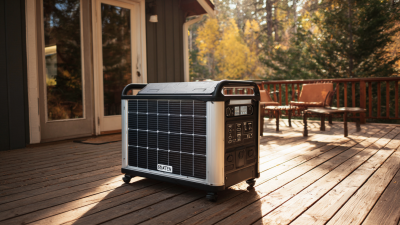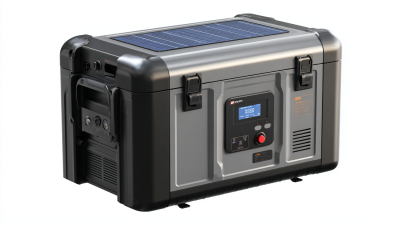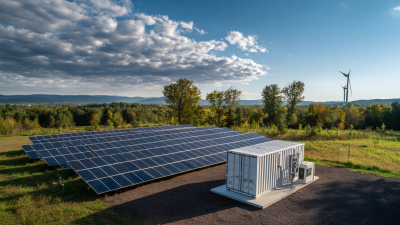MH Energy Your Better Solar and Energy Partner
MH Energy Your Better Solar and Energy Partner
 As the demand for renewable energy solutions continues to rise, the importance of selecting the right Household Solar Generator has become increasingly critical for environmentally-conscious consumers. According to a report by the International Energy Agency (IEA), global solar energy capacity reached 940 GW in 2020, projected to double by 2025. This surge in solar adoption highlights the necessity for individuals to understand their energy needs and choose generators that not only provide sufficient power but also align with their sustainability goals. With advancements in technology making solar generators more accessible and efficient, consumers are now faced with a variety of options, making informed choices essential. Whether for emergency backup or everyday use, understanding the features and benefits of these generators can significantly enhance energy independence while reducing one's carbon footprint in an ever-evolving energy landscape.
As the demand for renewable energy solutions continues to rise, the importance of selecting the right Household Solar Generator has become increasingly critical for environmentally-conscious consumers. According to a report by the International Energy Agency (IEA), global solar energy capacity reached 940 GW in 2020, projected to double by 2025. This surge in solar adoption highlights the necessity for individuals to understand their energy needs and choose generators that not only provide sufficient power but also align with their sustainability goals. With advancements in technology making solar generators more accessible and efficient, consumers are now faced with a variety of options, making informed choices essential. Whether for emergency backup or everyday use, understanding the features and benefits of these generators can significantly enhance energy independence while reducing one's carbon footprint in an ever-evolving energy landscape.
When choosing a household solar generator, understanding your power needs is paramount. Begin by assessing your energy consumption patterns. Take note of the appliances and devices you frequently use, such as refrigerators, lights, and electronics, and their power ratings. This will help to estimate the total wattage required for your household. You can use a simple calculation by multiplying the wattage of each appliance by the number of hours you plan to use them daily.
Once you have a clearer understanding of your energy consumption, you can select a solar generator that matches your requirements. Consider factors like surge capacity, which is crucial for devices that require extra power during startup. Additionally, keep in mind the generator's battery capacity; a higher capacity means it can store more energy, enabling you to run multiple devices for longer periods without interruption. By effectively assessing your power needs, you can ensure you choose a solar generator that provides a reliable and efficient energy solution tailored to your household's specific demands.
When considering the types of solar generators available, it's crucial to match your choice with your lifestyle needs. Portable solar generators, for instance, are perfect for camping enthusiasts or those living in RVs. According to a recent report by the Solar Energy Industries Association (SEIA), portable units have become increasingly popular, growing by over 30% in the last year alone. They offer flexibility and convenience for outdoor activities, allowing users to power devices without the hassle of noisy gas generators.
On the other hand, for homeowners looking for backup power during outages, stationary solar generators provide a robust solution. These units can store a significant amount of energy, often in the range of 10-20 kWh, making them suitable for powering essential home appliances. An important tip when choosing a stationary generator is to assess your household’s energy usage. The U.S. Department of Energy suggests conducting an energy audit to determine your power requirements before making a purchase.
Finally, consider hybrid solar generators, which combine solar panels with traditional fuel sources. This flexibility allows for continuous power supply, especially in areas prone to extended outages. As per industry data, hybrid systems are gaining traction, with a reported increase of 25% in sales in the past two years, indicating a shift towards adaptable energy solutions. By understanding your specific needs and the different types of solar generators available, you can make a well-informed decision that suits your lifestyle perfectly.
| Type of Solar Generator | Power Output (W) | Battery Capacity (Wh) | Run Time (Hours) | Best For |
|---|---|---|---|---|
| Portable Solar Generator | 300W | 600Wh | 5-8 Hours | Camping & Outdoor Activities |
| Home Backup Solar Generator | 1500W | 3000Wh | 12-24 Hours | Emergency Power Supply |
| Solar Generator with Inverter | 1000W | 2000Wh | 8-15 Hours | Household Appliances |
| All-in-One Solar Generator | 500W | 1500Wh | 10-20 Hours | Versatile Use |
| Hybrid Solar Generator | 2000W | 5000Wh | 24-48 Hours | Home & RV Use |
When selecting a household solar generator, one of the critical considerations is the balance between portability and efficiency. According to a recent report by the Solar Energy Industries Association (SEIA), the demand for portable solar generators has surged by 35% over the past year, as more consumers seek energy solutions that can be easily relocated for outdoor activities or emergencies. However, while portability is appealing, it often comes at the cost of efficiency and overall power output.
Tip 1: Prioritize your power needs. Assess the essential devices you want to run and choose a generator that offers an output sufficient for those needs. For example, many households require a minimum of 300 to 600 watts for basic appliances, while more robust setups may need upwards of 2,000 watts.
Tip 2: Consider battery capacity and charge times. The average lithium-ion battery used in solar generators ranges from 300Wh to over 2,000Wh. A higher capacity will offer greater energy reserves, but will often increase the weight and size of the unit, potentially impacting portability. Striking the right balance means evaluating how much energy you need during a power outage versus how frequently you'll need to transport the unit.
Ultimately, the decision between portability and efficiency should align with your specific lifestyle and energy requirements, ensuring that you find a generator that meets your needs without compromising on performance.

When selecting the right household solar generator, understanding battery capacity and lifespan is crucial. Modern lithium-ion batteries, commonly used in residential solar energy systems, typically degrade at an average rate of 1.8% per year. This means you can expect most batteries to last between 15 to 20 years with appropriate usage and maintenance. However, the longevity of these batteries is influenced by various factors, including usage patterns, charging cycles, and environmental conditions.
Recent studies suggest that optimizing charging practices can significantly enhance battery longevity. For instance, employing a simple charging strategy such as limiting the charge to 80% can moderately improve battery life, while innovative AI-driven charging techniques can potentially extend lifespans by up to 50%. This information is vital for homeowners looking to maximize the efficiency and lifespan of their solar generator systems. By understanding these key aspects of battery performance, you can make an informed decision that best meets your energy needs.
When considering the purchase of a household solar generator, budget plays a pivotal role in making the right choice. First, it's essential to set a realistic budget that considers not only the initial purchase price but also long-term savings and potential expenses. A solar generator typically has higher upfront costs compared to conventional generators; however, it can lead to significant savings on electricity bills and fuel costs over time. By calculating the expected return on investment (ROI), homeowners can determine how much they are willing to spend for future savings.
Additionally, it's beneficial to prioritize essential features based on needs rather than being swayed by every available option. Investing in a high-capacity battery might be more critical for those who frequently experience power outages, while others may prioritize portability and ease of use. Evaluating your energy consumption patterns can help clarify which features will provide the most value. Ultimately, taking a thoughtful approach to budgeting ensures that you choose a solar generator that fits your financial situation while meeting your energy needs effectively.







